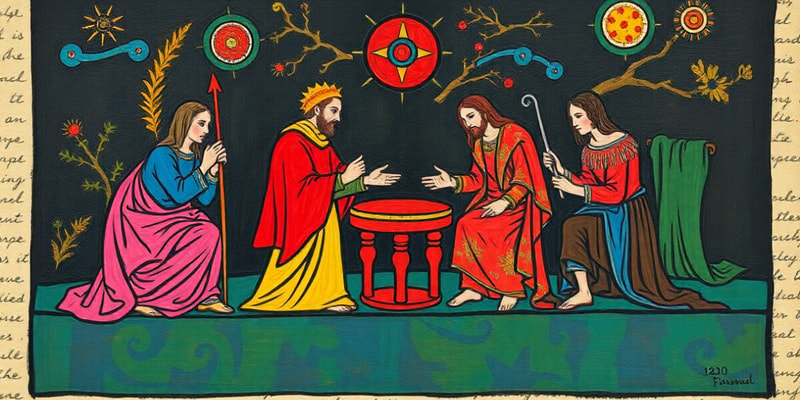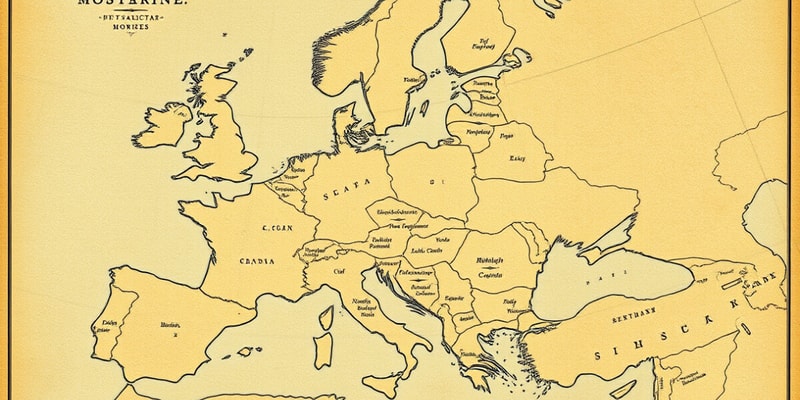Podcast
Questions and Answers
What is the primary focus of medieval criticism?
What is the primary focus of medieval criticism?
Which of the following figures is renowned for the allegorical interpretation of texts?
Which of the following figures is renowned for the allegorical interpretation of texts?
What type of criticism evaluates texts according to religious doctrine?
What type of criticism evaluates texts according to religious doctrine?
What significant cultural movement influenced medieval thought?
What significant cultural movement influenced medieval thought?
Signup and view all the answers
Which text is associated with Dante Alighieri's narrative critique of society?
Which text is associated with Dante Alighieri's narrative critique of society?
Signup and view all the answers
Which of the following was a result of the medieval revival of Greek and Roman texts?
Which of the following was a result of the medieval revival of Greek and Roman texts?
Signup and view all the answers
How did the use of vernacular languages during the Middle Ages affect literature?
How did the use of vernacular languages during the Middle Ages affect literature?
Signup and view all the answers
What did medieval criticism primarily set the stage for in later periods?
What did medieval criticism primarily set the stage for in later periods?
Signup and view all the answers
Study Notes
Medieval Criticism
-
Definition: Medieval criticism refers to the analysis and interpretation of literature, art, and philosophy during the Middle Ages, spanning roughly from the 5th to the late 15th century.
-
Context:
- Influenced by the fall of the Roman Empire and the rise of Christianity.
- Different cultural and intellectual movements, such as Scholasticism, shaped critical thought.
-
Key Features:
- Theocentrism: Focus on divine authority; texts were often interpreted in relation to God and moral lessons.
- Allegorical Interpretation: Texts were frequently analyzed for hidden meanings, often spiritual or moral lessons.
- Influence of Classical Thought: Revival of Greek and Roman texts led to integration of classical philosophy, especially Aristotle, into medieval thought.
-
Important Figures:
- St. Augustine: Emphasized allegorical interpretation and the role of God in literature.
- Thomas Aquinas: Merged faith and reason, influenced the critique of philosophical texts.
- Dante Alighieri: Through works like "The Divine Comedy," provided a narrative critique of contemporary society and theology.
-
Forms of Criticism:
- Theological Criticism: Evaluating texts based on how they align with religious doctrine.
- Philosophical Criticism: Engaged with topics of ethics, existence, and metaphysics, especially through dialectical methods.
- Literary Criticism: Focused on poetic structure, moral lessons, and rhetorical effectiveness.
-
Literary Movements:
- Development of genres such as epic poetry, religious drama, and medieval romance.
- Use of vernacular languages, leading to more accessible literature beyond Latin.
-
Impact:
- Set foundational elements for Renaissance humanism.
- Shift from strict adherence to authority towards a more nuanced understanding of texts.
- Paved the way for later critical theories in literature and philosophy.
-
Legacy: Medieval criticism influenced the Renaissance's revival of classical learning and laid the groundwork for modern literary criticism and theory.
Medieval Criticism
- Medieval criticism encompasses the analysis and interpretation of literature, art, and philosophy during the Middle Ages (roughly 5th to 15th centuries).
- This period witnessed the collapse of the Roman Empire and the rise of Christianity, shaping the context for intellectual development.
- Medieval critical thought was influenced by various movements, including Scholasticism, a philosophical approach that emphasized reason and logic.
- Medieval criticism was marked by its theocentric nature, interpreting texts through the lens of God and his authority.
- Allegorical interpretation was central to medieval criticism, with texts often being analyzed for hidden meanings, often spiritual or moral lessons.
- Classical thought, particularly the works of Aristotle, experienced a renewed emphasis during the Middle Ages, integrating into medieval thought.
- Some prominent figures in medieval criticism include:
- St. Augustine, who championed allegorical interpretation and emphasized the role of God in literature.
- Thomas Aquinas, known for merging faith and reason, influenced the critique of philosophical texts.
- Dante Alighieri, whose "The Divine Comedy" provided a narrative critique of his contemporary society and theology.
- Medieval criticism encompassed various forms, each focusing on specific aspects of the text:
- Theological Criticism: Judged texts based on their alignment with religious doctrine.
- Philosophical Criticism: Explored themes of ethics, existence, and metaphysics, often through dialectical methods.
- Literary Criticism: Analyzed poetic structures, moral lessons, and rhetorical effectiveness.
- The Middle Ages saw the development of key literary movements, shaping the landscape of literature:
- Genres like epic poetry, religious drama, and medieval romance emerged.
- Vernacular languages gained prominence, making literature more accessible beyond Latin.
- Medieval criticism played a crucial role in:
- Laying the groundwork for Renaissance humanism, a movement that emphasized human potential and individual reason.
- Shifting from strict adherence to authority towards a more nuanced understanding of texts.
- Paving the way for later critical theories in literature and philosophy.
- The legacy of medieval criticism is evident in its influence on the Renaissance's revival of classical learning and its contributions to the foundations of modern literary criticism and theory.
Studying That Suits You
Use AI to generate personalized quizzes and flashcards to suit your learning preferences.
Description
Explore the fundamental concepts of Medieval criticism, an analysis of literature, art, and philosophy from the Middle Ages. This quiz delves into theocentrism, allegorical interpretation, and the influence of classical thought on medieval perspectives. Test your knowledge on key figures like St. Augustine and Thomas Aquinas.




